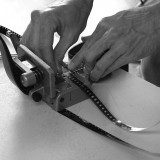Christopher and His Kind
By Christopher Isherwood
1
„At school, Christopher had fallen in love with many boys and been yearningly romantic about them. At college he had at last managed to get into bed with one. This was due entirely to the initiative of his partner, who, when Christopher became scared and started to raise objections, locked the door, and sat down firmly on Christopher’s lap. I am still grateful to him. I hope he is alive and may happen to read these lines.
Other experiences followed, all of them enjoyable but none entirely satisfying. This was because Christopher was suffering from an inhibition, then not unusual among upper-class homosexuals; he couldn’t relax sexually with a member of his own class or nation. He needed a working-class foreigner.“
„Christopher’s first visit to Berlin was short—a week or ten days—but that was sufficient; I now recognize it as one of the decisive events of my life. I can still make myself faintly feel the delicious nausea of initiation terror which Christopher felt as Wystan pushed back the heavy leather door curtain of a boy bar called the Cosy Corner and led the way inside. In the autumn of 1928, Christopher had felt a different kind of nauseated excitement, equally strong and memorable, when, as a medical student, he had entered an operating theater in St. Thomas’s Hospital to watch his first surgical operation. But the door of the operating theater, unlike that of the Cosy Corner, led him nowhere. Within six months, he had given up medicine altogether.
At the Cosy Corner, Christopher met a youth whom I shall call Bubi (Baby). That was his nickname among his friends, because he had a pretty face, appealing blue eyes, golden blond hair, and a body which was smooth-skinned and almost hairless, although hard and muscular. On seeing Bubi, Christopher experienced instant infatuation. This wasn’t surprising; to be infatuated was what he had come to Berlin for. Bubi was the first presentable candidate who appeared to claim the leading role in Christopher’s love myth.
What was this role? Most importantly, Bubi had to be the German Boy, the representative of his race. (Bubi was actually Czech, but that could be overlooked since German was the only language he spoke.) By embracing Bubi, Christopher could hold in his arms the whole mystery-magic of foreignness, Germanness. By means of Bubi, he could fall in love with and possess the entire nation.
That Bubi was a blond was also very important—and not merely because blondness is a characteristic feature of the German Boy. The Blond—no matter of what nationality—had been a magical figure for Christopher from his childhood and would continue to be so for many years. And yet I find it hard to say why … John Layard would have encouraged me to invent an explanation, never mind how absurd it sounded. He would have said that anything one invents about oneself is part of one’s personal myth and therefore true. So here is the first explanation which occurs to me: Christopher chose to identify himself with a black-haired British ancestor and to see the Blond as the invader who comes from another land to conquer and rape him. Thus the Blond becomes the masculine foreign yang mating with Christopher’s feminine native yin … This makes a kind of Jungian sense—but I can’t by any stretch of the imagination apply it to the relations between Bubi and Christopher. Bubi had been, among other things, a boxer, so he must have been capable of aggression. But with Christopher he was gentle, considerate, almost too polite.
In addition to being able to play the German Boy and the Blond, Bubi had a role which he had created for himself; he was the Wanderer, the Lost Boy, homeless, penniless, dreamily passive yet tough, careless of danger, indifferent to hardship, roaming the earth. This was how Bubi saw himself and how he made Christopher and many others see him. Bubi’s vulnerability, combined with his tough independence, was powerfully attractive and at the same time teasing. You longed to protect him, but he didn’t need you. Or did he? You longed to help him, but he wouldn’t accept help. Or would he?“
„Throughout Christopher’s stay in Berlin, Bubi spent a few hours with him every day. For Christopher, this was a period of ecstasy, sentimentality, worry, hope, and clock-watching, every instant of it essentially painful. Christopher wanted to keep Bubi all to himself forever, to possess him utterly, and he knew that this was impossible and absurd. If he had been a savage, he might have solved the problem by eating Bubi—for magical, not gastronomic, reasons. As for Bubi himself, he was the most obliging of companions; but there was nothing he could do, in bed or out of it, to make Christopher feel any more secure.“
…„The latter was highly educational entertainment for Christopher, as Wystan unkindly pointed out, since it shows the appalling consequences of trying to own someone who is naturally promiscuous. Christopher did indeed start to make a scene when Bubi broke a date with him. After being coached by Wystan, he painstakingly repeated a short speech which began: “Ich bin eifersuechtig” (I am jealous). Bubi listened patiently. Perhaps he even sympathized with Christopher’s feelings; for he himself, as Wystan found out later, had a weakness for whores and would pursue them desperately, giving them all the money he had. He then answered at some length, laying his hand on Christopher’s arm and speaking in a soothing tone. But Christopher’s German was still scanty and he couldn’t understand whatever lies Bubi was telling him.
All was soon forgiven, of course. When Christopher left for London, Bubi pulled a cheap gold-plated chain bracelet out of his pocket—probably an unwanted gift from some admirer—and fastened it around Christopher’s wrist. This delighted Christopher, not only as a love token but also as a badge of his liberation; he still regarded the wearing of jewelry by men as a daring act, and this would be a constant reminder to him that he was now one of the free. When he got home, he displayed the bracelet challengingly. But his mother, Kathleen, wasn’t shocked, only vaguely puzzled that he should care to wear anything so common.“

„Soon after getting back from Berlin, Christopher had a more than usually severe attack of tonsillitis. In those days, he was subject to sore throats. Wystan called them “the liar’s quinsy” and reminded him that Lane had said they are symptoms of a basic untruthfulness in one’s life. Christopher was quite willing to admit that his life in England was basically untruthful, since it conformed outwardly to standards of respectability which he inwardly rejected and despised. But Lane had also said, “Every disease is a cure, if we know how to take it,” and Christopher was now sure that he knew how to make his life truthful again. He studied German hard—from Hugo’s German in Three Months without a Master. He wrote letters in German to Bubi, which Bubi answered with tactful requests for money. And, as soon as he could afford the trip, he went back to Germany. This was in early July.“
„While the police were questioning him and Wystan, a letter was handed to Christopher by the innkeeper. It had a Dutch stamp on it. It was from Bubi. Christopher read it under their very noses. Bubi wrote that he was in Amsterdam and about to ship out as a deck hand on a boat to South America. Could Christopher send him some money as quickly as possible, poste restante? Bubi added that he wasn’t giving the address where he was staying because he was in Holland illegally and this letter might fall into the wrong hands. As for the money, Bubi had sworn to himself never to ask for any more, because Christopher had been so generous already. But now here he was, amongst strangers, all alone. There was no one he could trust in the whole world. Except Christopher, his last dear true friend … The letter thrilled Christopher unspeakably. As he read, he began to feel that he himself had become an honorary member of the criminal class. Now he must be worthy of the occasion. He must respond recklessly. He must leave for Amsterdam at once and see Bubi before he sailed.“
„When they left Rothehuette, the innkeeper was still friendly, despite the scandal of having had the police on his premises. He said to Wystan, with a tolerant grin, “I expect a lot of things happen in Berlin which we wouldn’t understand.“
„In Amsterdam, they ran into Bubi almost at once; he was going into the post office to see if Christopher had sent him a letter. Bubi’s astonishment and delight were all that Christopher had hoped for. Even more gratifying, after their first joyful embraces, was his sudden sadness: “We have so little time left, to be together.” Bubi was a true German in his enjoyment of emotional partings. He turned this short reunion with Christopher into a continuous farewell; they went for farewell walks, ate farewell meals, drank farewell toasts, made farewell love. Then the day came for Bubi’s ship to sail. His eyes brimmed with tears of heartfelt pity for the lonely Wanderer, as he wrung Christopher’s and Wystan’s hands, saying, “Who knows if we shall ever meet again!”
„(They did meet again, many times, in many different places. When Christopher next saw Bubi he was in Berlin, about three years later. Christopher found it very odd to be able to chatter away to him in German—odd and a little saddening, because the collapse of their language barrier had buried the magic image of the German Boy. Bubi seemed an entirely different person, not at all vulnerable, amusingly sly. Christopher felt wonderfully at ease with him and absolutely uninfatuated.)“

„On disembarking, all the passengers were asked to sign a guest book. Beside their two signatures, Wystan wrote a quotation from Ilya Ehrenburg’s poem about the Russian Revolution:
Read about us and marvel!
You did not live in our time—be sorry!“
„In August, Christopher left London for a remote seaside village where he had been engaged to tutor a small boy or at least keep him occupied during his school holidays. While Christopher was there, he had his first—and last—complete sex experience with a woman. After dark, in that tiny place, there was nothing social to do but play cards, get drunk, or make love. They were both drunk. She was five or six years older than he was, easygoing, stylish, humorous. She had been married. She liked sex but wasn’t in the least desperate to get it. He started kissing her without bothering about what it might lead to. When she responded, he was surprised and amused to find how easily he could relate his usual holds and movements to this unusual partner. He felt curiosity and the fun of playing a new game. He also felt a lust which was largely narcissistic; she had told him how attractive he was and now he was excited by himself making love to her. But plenty of heterosexuals would admit to feeling that way sometimes. What mattered was that he was genuinely aroused. After their orgasm, he urged her to come to his room, where they could take all their clothes off and continue indefinitely. She wouldn’t do this because she was now sobering up and getting worried that they might be caught together. Next day, she said, “I could tell that you’ve had a lot of women through your hands.“
„What did all this prove? That he had gained enormously in self-confidence. That sex, as sex, was becoming more natural to him—in the sense that swimming is natural when you know how to swim and the situation demands it. This he owed to Bubi.“

„He asked himself: Do I now want to go to bed with more women and girls? Of course not, as long as I can have boys. Why do I prefer boys? Because of their shape and their voices and their smell and the way they move. And boys can be romantic. I can put them into my myth and fall in love with them. Girls can be absolutely beautiful but never romantic. In fact, their utter lack of romance is what I find most likable about them. They’re so sensible.“
„Couldn’t you get yourself excited by the shape of girls, too—if you worked hard at it? Perhaps. And couldn’t you invent another myth—to put girls into? Why the hell should I? Well, it would be a lot more convenient for you, if you did. Then you wouldn’t have all these problems. Society would accept you. You wouldn’t be out of step with nearly everybody else.
„It was at this point in his self-examination that Christopher would become suddenly, blindly furious. Damn Nearly Everybody. Girls are what the state and the church and the law and the press and the medical profession endorse, and command me to desire. My mother endorses them, too. She is silently brutishly willing me to get married and breed grandchildren for her. Her will is the will of Nearly Everybody, and in their will is my death. My will is to live according to my nature, and to find a place where I can be what I am … But I’ll admit this—even if my nature were like theirs, I should still have to fight them, in one way or another. If boys didn’t exist, I should have to invent them.
„Psychologists might find Christopher’s admission damaging to his case, and his violence highly suspicious. They might accuse him of repressed heterosexuality. Wystan sometimes half jokingly did this, telling Christopher that he was merely “a heter with good taste,” and expressing fears that he would sooner or later defect. Nearly fifty years have passed, since then; and Wystan’s fears have been proved groundless.“











